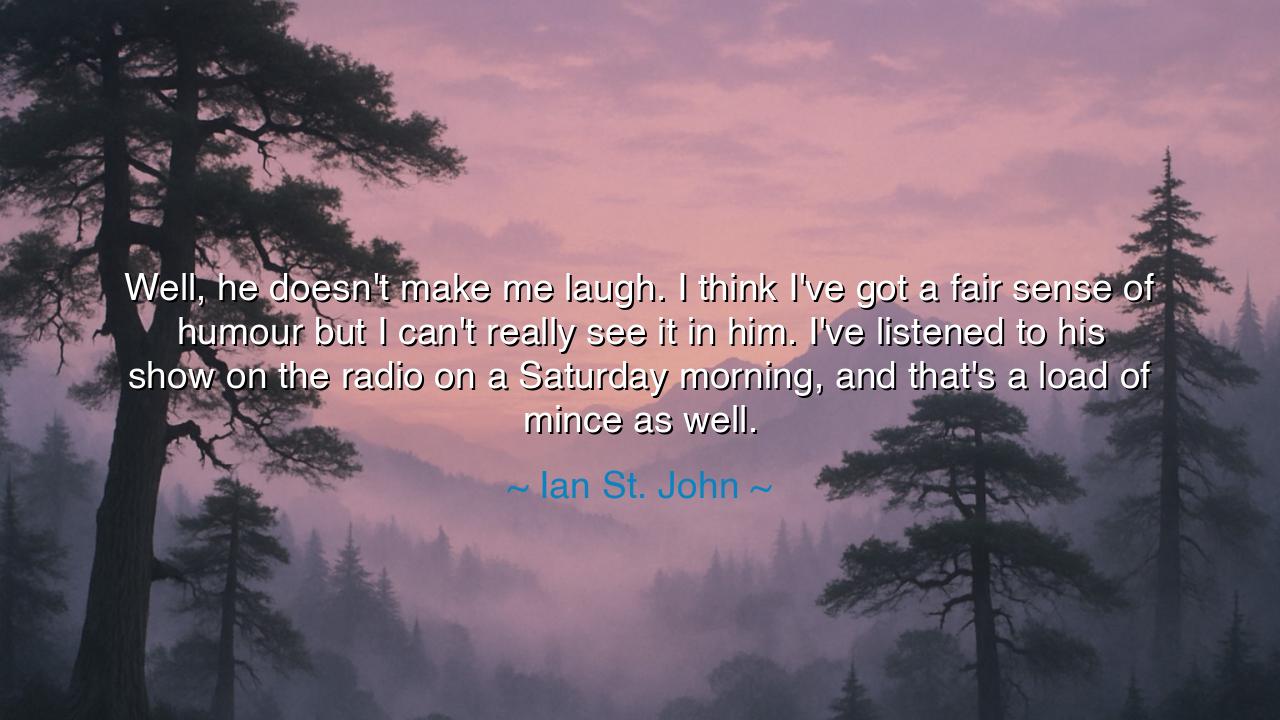
Well, he doesn't make me laugh. I think I've got a fair sense of
Well, he doesn't make me laugh. I think I've got a fair sense of humour but I can't really see it in him. I've listened to his show on the radio on a Saturday morning, and that's a load of mince as well.






"Well, he doesn't make me laugh. I think I've got a fair sense of humour but I can't really see it in him. I've listened to his show on the radio on a Saturday morning, and that's a load of mince as well." With these candid words, Ian St. John offers a perspective on humour, not as a subjective preference, but as something that resonates with authenticity and personal taste. He speaks not only of the difference in comedic sensibilities but also touches upon the importance of being able to connect with the forms of entertainment that truly engage us. Humour, as St. John points out, is a personal experience; what may seem amusing to one might not carry the same weight for another. It reflects how our inner truths, preferences, and experiences shape our perception of the world, including our capacity for laughter.
In the ancient world, humour was often regarded as a form of wisdom and insight. Aristophanes, the master of Greek comedy, used satire not just for laughter but for reflection on the society around him. His plays often poked fun at the political and social systems of Athens, yet in doing so, they challenged people to reflect on their own beliefs and the state of their world. Comedy, then, was not only for amusement but also for deep reflection. St. John's critique of the radio show is similar in that it suggests comedy is meant to spark a deeper response, not just an automatic or forced laugh. If a comedic performance does not resonate, it may fail to ignite the deeper emotional response that humour is intended to provoke.
The ancients often saw humour as the way in which the world’s absurdities were made bearable. Diogenes the Cynic, a philosopher who lived outside the social norms, was known for his use of wit and irony to challenge established values. Diogenes didn’t necessarily aim to make people laugh for the sake of laughter; rather, his humour was a tool to unmask societal hypocrisy and to provoke thought. Like St. John's commentary, Diogenes’ approach reveals that true humour often requires a discerning eye—a recognition of authenticity in the comedic act. If the humour fails to strike at something true and real, it loses its power, just as St. John feels about the radio show he mentions.
Consider the example of William Shakespeare, whose wit and humour spanned both lighthearted comedy and dark, biting satire. In his play Twelfth Night, the characters use wit and humour to reflect on the complexities of love and the absurdities of social norms. The play's humour is multi-dimensional: it is at once playful, sharp, and revealing. Just as St. John critiques the lack of connection in the radio show, Shakespeare’s humour resonates because it speaks to the audience on multiple levels. It laughs at and with the characters, ultimately revealing the truths beneath their actions. The best humour, as Shakespeare demonstrates, elicits thought and reflection, just as St. John yearns for humour that connects to his own sensibility.
This brings us to the deeper lesson in St. John's words: humour is not one-size-fits-all. Just as art and literature reflect the diversity of human experience, so too does comedy vary from person to person. One might find a great deal of humour in a satirical performance, while another may not connect with its underlying message or tone. Just as Socrates used dialogue to provoke thought, rather than simply to entertain, St. John reminds us that the best humour is that which speaks to the heart and the mind, challenging us to think more deeply, to understand more fully, and to appreciate the human condition.
The lesson here is that we should not dismiss humour that does not align with our tastes, but rather look for the underlying truth or the deeper purpose behind it. In our own lives, we are bound to encounter many forms of comedy and entertainment—some of which will not resonate with us. St. John’s critique invites us to seek humour that challenges us, that aligns with our values, and that engages our hearts and minds. Humour should not be empty; it should offer a way of seeing the world, one that reflects the complexities of life and, in doing so, offers both joy and insight.
Finally, let us take St. John’s words as a reminder to seek authenticity in the things we engage with. Whether it be in comedy, art, or even relationships, we must remember that true connection requires more than just a surface-level response—it requires the meeting of hearts and minds, a shared recognition of truth in all its forms. As we encounter humour in our lives, may we approach it not just as a means of entertainment, but as an invitation to engage more deeply with the world and ourselves.






AAdministratorAdministrator
Welcome, honored guests. Please leave a comment, we will respond soon